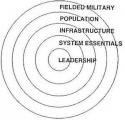[25]
Section Two
Who Leads, Who Manages, and Who Authorizes the Fundamental Administrative Decisions?
There is a dependable rule in Islamic activism which is, "Not every leader is a manager and not every manager is a leader".
If we were to abide by what we mentioned in the previous point, we should change (this phrase) into "Every leader is a manager but not every manager is a leader".
The manager or executive is any individual within the movement or the group — who has mastered the art of administration — who can be appointed to manage a financial or nutritional sector or the like without him knowing, to the extent possible, the secrets which would harm the work.
And as for the leader, he must be the object of complete reliance within the movement, and entrusted with its actions and its secrets. The leaders no doubt know many of the secrets of the movement to the same extent. Some of the leaders issue fundamental and secondary administrative decisions, while others issue decisions that include Sharia dimensions. Therefore, in our plan we open the door of management wide to those who have mastered its art.
As for the door of leadership, it is only open to those who are reliable, even though there is a security apparatus which keeps watch over the two doors, monitoring the professionalism of the actions of the leaders and the managers in order to prevent infiltration.
An important aspect of the higher administrative and political decisions:
In accordance with the preceding, an important point becomes apparent to us, which is:
What is the most important thing, from a Sharia and realistic standpoint, that should be abundantly found in leaders who issue higher administrative decisions which include the targeting of some classes of people and not others?
Even if the High Command, the field commanders directing the work, or those who are usually distinguished by experience and political shrewdness generally issue higher administrative and political decisions, one should pay particular attention to the administrative decisions concerning the targeting of certain classes of people and not others. Naturally, these fundamentally require setting a guideline and issuing a precise or secret sharia judgment which must be passed by those firmly-rooted in knowledge in the main jihad movement before it is issued, or, if it is impossible to refer to the ulama of the main jihad movement, a scholar firmly-rooted in knowledge must be convinced of it in accordance with the correct Sharia criterions.
Of course there are classes of people who the mujahid-salafi movements, by means of their firmly-rooted ulama, have deemed to be permissible and necessary targets. I believe that this is sufficient at our current stage and the decision (to target others) at this time should be left to the High Command and the political leadership, who can determine the benefit of targeting them now or delaying that. This is to be done through consultation with the mid-level, learned cadres, at the very least. However, our words and our warning here concern what will come from (later) stages and what will be found among classes of people in the future or in the coming stages. The decision to target them or refrain from that is not only left to the learned cadres, but also to those firmly-rooted in knowledge from the beginning, just as we said.









 )
) ).
).





Bookmarks